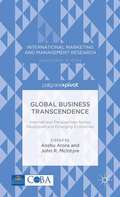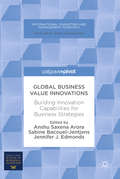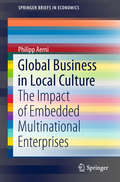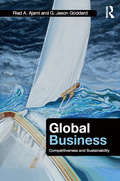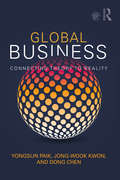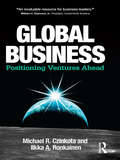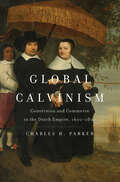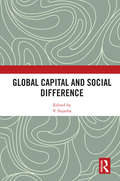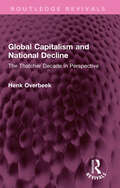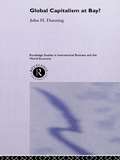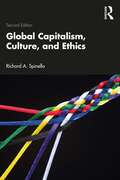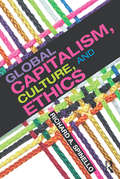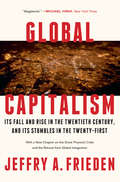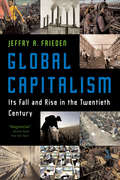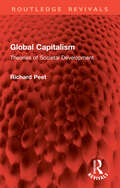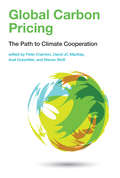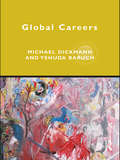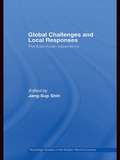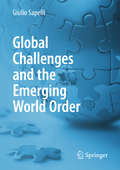- Table View
- List View
Global Business Transcendence: International Perspectives across Developed and Emerging Economies
by John R. Mcintyre Anshu Saxena AroraGlobal Business Transcendence argues that country's borders are becoming less important from a trade perspective. We are thus quickly approaching a single global economy.
Global Business Value Innovations: Building Innovation Capabilities For Business Strategies (International Marketing And Management Research Ser.)
by Anshu Saxena Arora Sabine Bacouel-Jentjens Jennifer J. EdmondsThis edited collection is a uniquely positioned contribution of interrelated research papers about global business value transformations in both offline and online (digital) worlds. With chapters spanning multiple business disciplines such as strategy, organizational behavior and e-commerce, this book explores the impact of cross-cultural issues, characteristics and challenges with regard to global value innovations. The authors analyze the effects of institutional and regulatory change on international marketing and management from both traditional and digital perspectives, providing concepts and cases for students and academics.
Global Business in Local Culture: The Impact Of Embedded Multinational Enterprises (SpringerBriefs in Economics)
by Philipp AerniThis book examines the impact of multinational enterprises (MNEs) on local economies, and presents selected case studies of MNEs operating in low income countries. By balancing external social and environmental costs against its corresponding benefits, the book demonstrates that MNEs can have a positive net-impact on local development if they build up social capital by embedding themselves in local economies and engaging responsibly with local stakeholders. By doing so MNEs contribute to inclusive growth, a cental pillar of the UN Sustainable Development Goals. In this context, the book challenges popular narratives in civil society and academia that frame foreign direct investment (FDI) merely as a threat to human rights and sustainable development. Moreover, it offers practical guidance for globally operating businesses seeking to establish progressive Corporate Social Responsibility (CSR) strategies of their own.
Global Business: Competitiveness and Sustainability
by Riad A. Ajami G. Jason GoddardGlobalization has been under extreme pressure in the wake of the financial crisis. Multinational firms are weighing the costs and benefits of international scale and scope, and are increasingly under pressure to hire local, to source local, and to pay taxes domestically. At the same time global competitive pressures have intensified. This book reviews international business practices from the multinational firm perspective, and provides pathways forward concerning competitiveness and sustainability in global markets. What sets this book apart from others is that the benefits and pitfalls of globalization are addressed. Chapter coverage focuses on the functional areas of the business and how they are impacted by international expansion. Practical case studies supplement chapter coverage and highlight both positive and negative developments in the global business arena. Readers should expect to be challenged on what will be the limits of the multinational firm in the future, and how multinational firms can continue to prosper while at the same time adhere to sustainable business initiatives. Equally useful to both undergraduate and graduate students of international business as well as professional development programs, Global Business: Competitiveness and Sustainability provides a necessary tonic for dealing with today’s troubled seas of globalization.
Global Business: Connecting Theory to Reality
by Dong Chen Jong-Wook Kwon Yongsun PaikThis textbook is designed to help students understand the key issues of global business by connecting theory with reality. Divided into three parts, it covers critical issues of international business, introducing readers to topics they will connect with, and discussing core concepts. With a user-friendly pedagogy and a host of helpful visuals, the authors offer a practitioner’s perspective on global business knowledge, examining familiar theory on trade, direct investment, and political environment alongside fresh topics, like geopolitical conflicts, emerging markets, and sustainability. Over sixty case studies are included to illustrate the magnitude and complexity of global business involving different stakeholders. Undergraduate students looking for an introduction to international business and graduate students looking to apply their knowledge will find Global Business stimulating, since it demonstrates how theories and concepts work in real-world business settings.
Global Business: Positioning Ventures Ahead
by Ilkka A. Ronkainen Michael R. CzinkotaGlobal Business: Positioning Ventures Ahead alerts every business to the new windows of opportunity open to those willing to explore global markets. Authors Czinkota and Ronkainen bring readers quickly up to speed on the essentials of international marketing, explaining all the strategic alternatives for going global—from exporting and licensing to distributorships and joint ventures. They illustrate how to present, promote, and price products and services to appeal to multiple world markets and how to strike back when world competitors move into one’s territory. Each chapter concludes with "Food for Thought" questions that challenge the reader to think more deeply about entry into the global market, as well as further readings and online resources that provide useful references for continuing investigation. Global Business: Positioning Ventures Ahead equips readers with the skills to ride out the risks and reap the rewards of world-class engagement.
Global Calvinism: Conversion and Commerce in the Dutch Empire, 1600-1800
by Charles H. ParkerA comprehensive study of the connection between Calvinist missions and Dutch imperial expansion during the early modern period &“A tour de force offering the reader the best study of global Calvinism in the realms of the Dutch East India Company.&”—Ronnie Po-Chia Hsia, editor, Calvinism and Religious Toleration in the Dutch Golden Age Calvinism went global in the seventeenth and eighteenth centuries, as close to a thousand Dutch Reformed ministers, along with hundreds of lay chaplains, attached themselves to the Dutch East India and West India companies. Across Asia, Africa, and the Americas where the trading companies set up operation, Dutch ministers sought to convert &“pagans,&” &“Moors,&” Jews, and Catholics and to spread the cultural influence of Protestant Christianity. As Dutch ministers labored under the auspices of the trading companies, the missionary project coalesced, sometimes grudgingly but often readily, with empire building and mercantile capitalism. Simultaneously, Calvinism became entangled with societies around the world as encounters with indigenous societies shaped the development of European religious and intellectual history. Though historians have traditionally treated the Protestant and European expansion as unrelated developments, the global reach of Dutch Calvinism offers a unique opportunity to understand the intermingling of a Protestant faith, commerce, and empire.
Global Capital and National Governments
by Layna MosleyThis book examines the degree to which international financial markets affect governments' policy choices. It provides empirical evidence as to whether financial globalization creates pressures on governments of developed and developing nations to pursue similar policies and to reduce spending on social policies. The book suggests that financial globalization does not lead to a "race to the bottom" among governments, especially in developed nations. It deploys several types of evidence; the most unique are interviews and surveys of investment fund managers. It also compares contemporary government-financial market relations to those prior to World War I.
Global Capital and Social Difference
by V. SujathaThis volume offers insights into ongoing, global socio-economic transformations by directing attention to the significance of labour, work, craft, community, social institutions, social movements and, emergent subjectivities in different parts of the world. This is in contrast to theories that project globalisation as a process driven exclusively by global capital and technology, a scheme in which some parts of the world forever will be ‘peripheries’ supplying labor and natural resources, the lives and work of those people purged of originality, meaning and value by the very construct that describes them. Together the chapters in the book present a non-essentialist and non-linear reading of global transformations by examining the relations and adaptations between economy, polity and society, which remains a fundamentally unresolved question in the social sciences. Combining a wealth of conceptual and empirical investigations, this book will be of interest to scholars and researchers of sociology, globalisation studies, anthropology, economics, development studies, and Area studies.
Global Capitalism and National Decline: The Thatcher Decade in Perspective (Routledge Revivals)
by Henk OverbeekFirst published in 1990, Global Capitalism and National Decline is a major contribution to the study of British political and economic decline. The author concentrates on the global nature of capitalism as the context for the development of national capitalism, and on the relationship between internal and external factors. A long-term view of British politics enables him to demonstrate that competing popular explanations of Britain’s crisis and the rise of Thatcherism in response to it, are in fact interconnected. The long decline of Britain originating in the 19th century, the inherent weakness of the post-1945 settlement, and the critical events of 1970s, acquire their fullest meaning when seen as different ‘layers’ of one and the same historical process. Henk Overbeek takes the story of Britain’s decline through to Margaret Thatcher’s tenth anniversary in office. His book will be invaluable to scholars and students of economics, politics, and history. it offers a clear perspective on the problems of national decline within a global context, and on Britain’s position in Europe and in the wider world.
Global Capitalism and the Crisis of Humanity
by William I. RobinsonThis exciting new study provides an original and provocative exposé of the crisis of global capitalism in its multiple dimensions - economic, political, social, ecological, military, and cultural. Building on his earlier works on globalization, William I. Robinson discusses the nature of the new global capitalism, the rise of a globalized production and financial system, a transnational capitalist class, and a transnational state and warns of the rise of a global police state to contain the explosive contradictions of a global capitalist system that is crisis-ridden and out of control. Robinson concludes with an exploration of how diverse social and political forces are responding to the crisis and alternative scenarios for the future.
Global Capitalism at Bay (Routledge Studies In International Business And The World Economy Ser. #Vol. 21)
by Professor John DunningIn this collection of his latest essays, John H. Dunning - renowned authority in international business - elaborates his theories on the current situation of foreign direct investment and multinational enterprises. Global Capitalism at Bay considers the unique characteristics of contemporary capitalism, and what must be done if it is to survive and
Global Capitalism, Culture, and Ethics
by Richard A. SpinelloThis book seeks to deepen the reader’s understanding of the complex ethical and social disputes that corporations and managers face in an increasingly globalized world. It reviews the history and nature of global capitalism along with the role of the multinational within the global economy. Special attention is paid to emerging and frontier markets where there is economic potential but also major challenges due to institutional voids. Globalization is a constantly evolving field. In addition to exploring basic economic concepts and ethical frameworks, this second edition takes into account many new developments across different industries, ranging from "Big Tech" to "Big Pharma." It reviews some of the controversies that have affected those industries including bribery, censorship, the politics of computer networking, sweatshops, divestment, and the intensifying crisis of climate change. The book now includes short case studies to help spur creative reflection. Also, the revised content is highlighted in two new chapters – "Bribery and Corruption" and "Emerging and Frontier Markets." The book is ideal for use as a textbook on globalization, and specifically for courses that want to introduce a social responsibility or ethical component at both undergraduate and postgraduate levels.
Global Capitalism, Culture, and Ethics
by Richard SpinelloSelected as an Outstanding Academic Title by Choice Magazine in 2014! This book aims to deepen the student’s understanding of the complex ethical challenges that businesses face in an increasingly globalized world. As the world moves towards greater interdependence, it has been demonstrated that globalization is linked to economic growth. This raises a critical question: as a key player in fostering economic growth, how does the multinational corporation function as a moral agent? Global Capitalism, Culture, and Ethics offers a sophisticated analysis of theoretical ethical issues such as universalism versus pluralism; the connection between law and morality; the validity of a corporate social agenda; and the general parameters of moral responsibilities for multinational corporations. With these foundational issues addressed, the book proceeds to analyze a number of specific controversies such as the proper scope of political activism, disinvestment, environmental sustainability, and responsible sourcing from low wage countries. The analysis of globalization is not confined to a treatment of the moral obligations of multinational corporations, but also reviews the history of global capitalism, the interdependence between governments and multinational corporations, and the beneficial and harmful effects of globalization on social welfare. Weaving together themes from economics, history, philosophy, and law, this book allows the reader to appreciate globalization from multiple perspectives. Its theoretical cogency and uncompromising clarity make it a rewarding read for students interested in issues of ethics and globalization.
Global Capitalism, Global War, Global Crisis
by Andreas Bieler Adam David MortonThis book assesses the forces of social struggle shaping the past and present of the global political economy from the perspective of historical materialism. <P><P>Based on the philosophy of internal relations, the character of capital is understood in such a way that the ties between the relations of production, state-civil society, and conditions of class struggle can be realised. Conceiving the internal relationship of global capitalism, global war, global crisis as a struggle-driven process is a major contribution of the book providing a novel intervention on debates within theories of 'the international'. <P>Through a set of conceptual reflections, on agency and structure and the role of discourses embedded in the economy, class struggle is established as our point of departure. This involves analysing historical and contemporary themes on the expansion of capitalism through uneven and combined development (global capitalism), the role of the state and geopolitics (global war), and conditions of exploitation and resistance (global crisis). The conceptual reflections and thematic considerations raised earlier in the book are then extended in a series of empirical interventions. These include a focus on the 'rising powers' of the BRICS (global capitalism), conditions of the 'new imperialism' (global war), and the financial crisis since the 2007–8 Great Recession (global crisis). <P>As a result of honing in on the internal relations of global capitalism, global war, global crisis the final major contribution of the book is to deliver a radically open-ended dialectical consideration of ruptures of resistance within the global political economy.<P> Provides the definitive account of the internal relations of global capitalism, global war, global crisis shaping contemporary world order.<P> Makes a major intervention in debates across the social sciences from a historical materialist perspective.<P> Delivers key insights on the expansion of capitalism through uneven and combined development (global capitalism), the role of the state and geopolitics (global war), and conditions of exploitation and resistance (global crisis).
Global Capitalism: Its Fall And Rise In The Twentieth Century
by Jeffry A. Frieden"One of the most comprehensive histories of modern capitalism yet written." —Michael Hirsh, New York Times An authoritative, insightful, and highly readable history of the twentieth-century global economy, updated with a new chapter on the early decades of the new century. Global Capitalism guides the reader from the globalization of the early twentieth century and its swift collapse in the crises of 1914–45, to the return to global integration at the end of the century, and the subsequent retreat in the wake of the financial crisis of 2008.
Global Capitalism: Its Fall and Rise in the Twentieth Century
by Jeffry A. FriedenIn 1900 international trade reached unprecedented levels and the world's economies were more open to one another than ever before. Then as now, many people considered globalization to be inevitable and irreversible. Yet the entire edifice collapsed in a few months in 1914. Globalization is a choice, not a fact. It is a result of policy decisions and the politics that shape them. Jeffry A. Frieden's insightful history explores the golden age of globalization during the early years of the century, its swift collapse in the crises of 1914-45, the divisions of the Cold War world, and the turn again toward global integration at the end of the century. His history is full of character and event, as entertaining as it is enlightening.
Global Capitalism: Theories of Societal Development (Routledge Revivals)
by Richard PeetIn Global Capitalism (originally published in 1991), Richard Peet surveys the various approaches made by social theory towards seeing history in terms of its regional dynamics. He reviews environmental determinism, modernization, dependency, and world systems theories, and argues that the most capacious and dynamic model continues to be historical materialism.The volume presents a broad outline of global development through time, analysing primitive communism, lineage societies and the various kinds of tributary modes, and providing a closer examination of capitalism in terms of the phases and forms of its past and present. The author defends the centrality of structural Marxism to theories of global development and argues that its ideas can be furthered by the partial synthesis of other perspectives, such as the feminist critique.This book assumes no previous knowledge of the theories surveyed. It introduces complex material in an understandable form and will be valuable both to development professionals and to anyone interested in societal change.
Global Carbon Pricing: The Path to Climate Cooperation (The\mit Press Ser.)
by Peter Cramton Axel Ockenfels David MacKay Steven StoftWhy the traditional “pledge and review” climate agreements have failed, and how carbon pricing, based on trust and reciprocity, could succeed.After twenty-five years of failure, climate negotiations continue to use a “pledge and review” approach: countries pledge (almost anything), subject to (unenforced) review. This approach ignores everything we know about human cooperation. In this book, leading economists describe an alternate model for climate agreements, drawing on the work of the late Nobel laureate Elinor Ostrom and others. They show that a “common commitment” scheme is more effective than an “individual commitment” scheme; the latter depends on altruism while the former involves reciprocity (“we will if you will”).The contributors propose that global carbon pricing is the best candidate for a reciprocal common commitment in climate negotiations. Each country would commit to placing charges on carbon emissions sufficient to match an agreed global price formula. The contributors show that carbon pricing would facilitate negotiations and enforcement, improve efficiency and flexibility, and make other climate policies more effective. Additionally, they analyze the failings of the 2015 Paris climate conference.ContributorsRichard N. Cooper, Peter Cramton, Ottmar Edenhofer, Christian Gollier, Éloi Laurent, David JC MacKay, William Nordhaus, Axel Ockenfels, Joseph E. Stiglitz, Steven Stoft, Jean Tirole, Martin L. Weitzman
Global Careers (Global HRM)
by Michael Dickmann Yehuda BaruchWith interest in the global environment and the management of ‘talent’ increasing, understanding the issue of global careers is crucial for students and managers alike. This exciting book captures broad research extending to a large set of diverse motivations, experiences, and outcomes of international work in global ‘for profit’ and ‘not for profit’ organizations and delivers nuanced insights into the management of international employees for firms and governmental/non-governmental organizations. This text covers global career issues in-depth, working at the intersection of career and international human resource management and using a number of perspectives, such as organizational or individual ones. Chapters include: theories, frameworks and concepts supporting research/data where relevant managerial implications, summaries, learning points, figures and tables. Illustrated with up to the minute case studies from companies such as Pepsi, Imperial Tobacco, Cadbury Schweppes, PricewaterhouseCoopers, Philips, HSBC, Misys, Philip Morris International and Masterfoods, Global Careers is essential reading for all those studying or concerned with career management, human resource management and international business.
Global Cases in Best and Worst Practice in Crisis and Emergency Management
by Ali FarazmandGlobal Cases in Best and Worst Practice in Crisis and Emergency Management is the first book to focus on select global cases from the perspective of best and worst practices in the context of crisis and emergency management. Bringing together the most established scholars and experts in the field, it offers theories along with an empirical, success
Global Cases on Hospitality Industry
by Timothy L. LockyerGet a comprehensive research-based look at real life hospitality industry issues from leaders in the field Global Cases on Hospitality Industry is a comprehensive examination into hospitality issues around the world. This detailed look at the industry’s dynamics uses an international perspective that provides reader understanding by spanning several strategic and functional areas in management practices. Leading academics, trainers, and consultants from around the globe offer research-based perspectives on real life issues in this competitive industry. This important text extensively explores various aspects of the industry from both Asian and Western countries, providing important insights into policymaking, research, consulting, and teaching. Global Cases on Hospitality Industry presents extensively-researched illustrative case studies and accounts of revealing management practices from experts around the world. This book explains both the positive and negative impact of certain real life policy and management decisions in various aspects of the industry. This text discusses topics such as marketing, human resources, strategy, entrepreneurship, the use of technology, and ethics, using inside looks into different hospitality and travel and tourism companies. The book includes numerous figures and tables to clearly illustrate research data. Topics in Global Cases on Hospitality Industry include: consumer marketing research price promotions consumer behaviors bed and breakfast expectation analysis assessment of service quality company organizational structure labor productivity human resource issues franchise restaurants impact around the world tour operator strategies similarity of problems between the hospitality and tourism industries heritage tourism societal effects of tourism development ethical challenges and much more!Global Cases on Hospitality Industry is essential reading for hospitality management educators, students, trainers, and researchers in services management.
Global Challenges and Local Responses: The East Asian Experience (Routledge Studies in the Modern World Economy #Vol. 67)
by Jang-Sup ShinEast Asia has in many ways been the cockpit of the globalization process. If the phenomenon as it is generally defined is largely recognized as a relatively recent one, the countries that have experienced most change during this period have been in the region. Rapid economic growth leading to the Tigers label was followed by financial crisis and partial recovery. Underlying this has been the remarkable success story of Japan since the Second World War, followed by the current, seemingly inexorable progress of China towards centrality on the world stage. Jang-Sup Shin has amassed an international team of contributors to shed light on how the various Asian countries have responded to the globalization process. These include James Crotty, Lu Ding and Ha-Joon Chang.
Global Challenges and the Emerging World Order
by Giulio SapelliThis book offers a fascinating overview of the challenges posed by the world's new geostrategic order and likely future directions. It opens with an unconventional view of the Arab Spring, identifying its origins in the relative US withdrawal from the Middle East caused by both the need for military disengagement for economic reasons and the discovery of shale gas and tight oil in the heart of the North American continent. The rise in the geostrategic importance of Putin's Russia is explored in this context. The implications of the worldwide economic crisis are analyzed in depth: the author's interpretation is that the world is entering a phase of unstable growth generated by hyper financialization and deflation. Against this background, the book explores the US attempt to trigger growth through the Transatlantic Trade and Investment Partnership, the impact of the Trans-Pacific Partnership (based on the US-Australia military alliance) in restraining China's advance, and the potential for Africa to become the driver of the world's economic future if it can resist Chinese penetration and continue the nation-building process.
Global Challenges in Energy and Environment: Select Proceedings of ICEE 2018 (Lecture Notes on Multidisciplinary Industrial Engineering)
by S. Subramanian V. SivasubramanianThis book comprises select proceedings of the International Conference on Energy and Environment - Global Challenges (ICEE 2018). The book focuses on applications of green technologies in chemical and biochemical engineering, wastewater treatment, energy and environmental sustainability. It covers current environmental issues such as air pollution and control, solid waste management and wastewater treatment, and suggests potential solutions to tackle them. The contents of this book will be useful to students and researchers working in the field of energy and environmental engineering.
